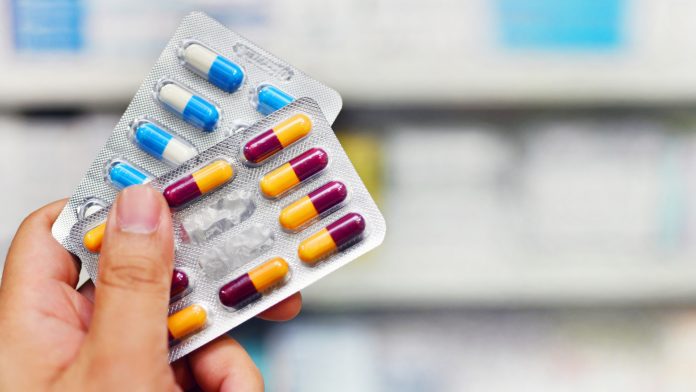
A new study conducted in an Egyptian hospital showed that treating COVID patients with antibiotics resulted in similar recovery times as patients who were given standard treatment.
Researchers found that treating COVID patients with either one of two antibiotics (ceftazidime or cefepime, in combination with a steroid) resulted in similar recovery times compared to patients given standard treatment.
It is common practice not to prescribe antibiotics for treating COVID and other viral infections. As not only will they not treat the viral infection, but unnecessary prescriptions can also cause antibiotic resistance. The overuse of antibiotics in recent years means they have become less effective and certain strains of bacteria have developed resistance to certain antibiotics.
Yet, in a recent study conducted in an Egyptian hospital, the researchers showed that treating COVID that is moderate to severe with either one of two antibiotics (ceftazidime or cefepime, in combination with a steroid), resulted in similar recovery times compared to patients given standard treatment.
Treating COVID with standard treatment versus antibiotics
The standard treatment, authorised by the Egyptian government and approved by the World Health Organization, was made up of at least seven different medications, suggesting that treating COVID with antibiotics could simplify this process and lead to comparable recovery times.
However, why did the researchers break the rule of treating COVID with antibiotics?
Traditionally, the process of creating new drugs to treat diseases takes an extended period. New treatment development can take years, costs a lot of money, and has a very low success rate. Regardless, this process is generally acceptable when targeting common diseases.
The time-consuming process of developing new treatment is not viable when there is a high threat posed by an emerging infectious disease, such as COVID and Ebola and without quick intervention and effective treatments, emerging diseases can evolve into pandemics – highlighted in the COVID pandemic where over 5.4 million people died globally.
Drug developers and major pharmaceutical companies look for a quicker alternative to the typical drug-development process when faced with a new threat. One practical strategy is drug repurposing. This is where drugs already created and approved for one use are tested to see if they can also help treat the new disease.
As a result of the drugs being shown as safe, and plenty is known about how they work, this is potentially a much less risky and time-consuming way of developing a treatment for the new disease. The researchers used antibiotics for treating COVID, using the drug repurposing strategy.
New ways to use antibiotics
With a viral disease like COVID, a drug considered for repurposing should show one of these three qualities: it should either be able to inhibit one or more stages of the coronavirus’s replication cycle; relieve the bad effects of the virus; or manipulate the immune system so that the body can deal with the virus.
Surprisingly, antibiotics are often substances that show potential. Although viruses are different to bacteria, they are sometimes also susceptible to antibiotics. The statement that antibiotics don’t work against viruses doesn’t apply 100% of the time.
For example, in response to the Zika crisis five or so years ago, an American study evaluated more than 2,000 drugs already approved by the US Food and Drug Administration to see if they could potentially be safely used in pregnancy against the virus. The study found that the antibiotic azithromycin could reduce the proliferation of the virus in the brains of unborn children, thus potentially protecting against microcephaly, a condition caused by the virus in newborns.
Separately, testing also showed that the antibiotic novobiocin had a strong antiviral effect against the Zika virus. And a 2016 drug-repurposing study conducted in Thailand identified minocycline as a promising antiviral drug against the dengue virus, with this antibiotic inhibiting the virus’ growth at various stages of its life cycle.
All of these studies gave the researchers confidence that repurposing antibiotics for treating COVID was a plausible idea.
Broad-spectrum antibiotics for COVID
Research had already shown that a number of antibiotics were good at stopping the coronavirus reproducing in lab tests – including ceftazidime and others of the same class, which is known as “beta-lactams”. This led the researchers to recognise this drug class had the potential for treating COVID.
The researchers ran computer simulations of how ceftazidime and cefepime (another beta-lactam) would interact with the virus; they were both effective at disrupting its protease, a key enzyme the virus uses to reproduce.
Ceftazidime and cefepime are also broad-spectrum antibiotics that are widely used to treat critically ill patients who pick up infections in hospitals. As COVID patients often end up with other infections at the same time, the researchers stated that they believed these drugs might help severely ill patients by clearing other infections they might have, helping prevent conditions such as pneumonia.
However, the researchers claim that it is not clear how much of the antibiotics’ effect in our Egyptian hospital study was down to clearing coinfections versus how much was due to them attacking the coronavirus directly. The notion that beta-lactams have antiviral properties is based on computer simulations and lab experiments – it hasn’t been 100% proven.
The researchers state that whilst antibiotics should be prescribed carefully; they might have a role to play against COVID in the future.
























